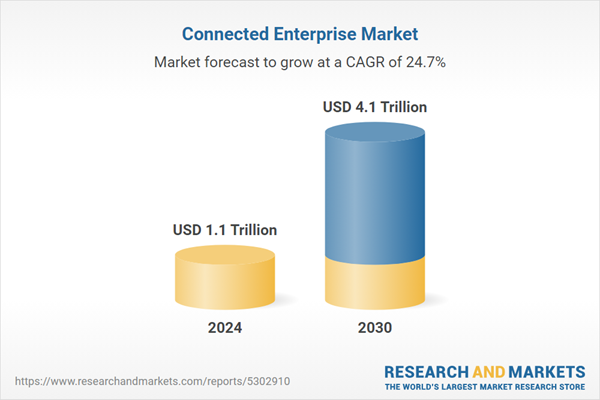Global Connected Enterprise Market - Key Trends & Drivers Summarized
What Is a Connected Enterprise, and Why Is It Transforming Modern Business?
A connected enterprise refers to an organization that integrates its operations, people, processes, and assets through advanced digital technologies, enabling real-time data exchange and informed decision-making across all levels. Leveraging technologies such as IoT, cloud computing, big data, and artificial intelligence (AI), connected enterprises have full visibility into their operations, from production and supply chain to customer engagement and asset management. This connectivity enhances operational efficiency, reduces downtime, and improves agility in responding to market demands. For industries such as manufacturing, retail, healthcare, and logistics, adopting a connected enterprise approach fosters resilience and a competitive edge in increasingly dynamic markets.The importance of a connected enterprise lies in its capacity to unify and streamline diverse business functions. By connecting and monitoring assets, employees, and operations, companies can optimize production workflows, enhance productivity, and reduce costs through predictive maintenance and process automation. The data generated by a connected enterprise provides actionable insights that enable businesses to respond to changing customer needs quickly, improving customer satisfaction and loyalty. As digital transformation continues to shape the business landscape, connected enterprise solutions are becoming fundamental in driving growth, efficiency, and innovation.
How Are Technological Advancements Shaping the Connected Enterprise Market?
Technological advancements are enhancing connected enterprise solutions, making them more efficient, scalable, and adaptable to various industries. IoT and edge computing are pivotal technologies that allow businesses to collect and process data from distributed assets in real time, reducing latency and enabling swift decision-making. With edge computing, data can be analyzed directly at the source - be it manufacturing machinery, warehouse systems, or retail sensors - enhancing responsiveness and efficiency, particularly in sectors that require real-time insights. Furthermore, AI and machine learning algorithms are being integrated into connected enterprise platforms, enabling predictive analytics, anomaly detection, and demand forecasting, which optimize operations and enhance business continuity.Cloud computing has also expanded the accessibility of connected enterprise platforms, providing secure, scalable infrastructure that facilitates data storage, sharing, and collaboration across departments and geographies. Additionally, advancements in cybersecurity are addressing the growing need for data protection, as connected enterprises handle vast amounts of sensitive information. By combining connectivity with robust security measures, businesses can protect against cyber threats and ensure compliance with data privacy regulations. These technological innovations make connected enterprise solutions more adaptable, supporting seamless integration and scalability across industries, and positioning connected enterprises as leaders in digital transformation.
What Are the Key Applications of Connected Enterprises Across Industries?
Connected enterprise solutions have broad applications across multiple industries, enhancing operations and supporting data-driven decision-making. In manufacturing, connected enterprise platforms enable predictive maintenance and asset management, reducing unplanned downtime and increasing productivity. These platforms also facilitate digital twins - virtual models of physical assets - allowing manufacturers to simulate and optimize production processes, improving efficiency and reducing costs. In retail, connected enterprise solutions provide real-time insights into customer behavior and inventory management, helping retailers tailor product offerings, optimize pricing, and streamline supply chain operations for better customer satisfaction and profitability.In healthcare, connected enterprise systems enhance patient care and hospital management by enabling real-time tracking of medical equipment, patient data, and staff workflows. Logistics and transportation benefit from connected enterprise solutions through real-time asset tracking and fleet management, which improve delivery efficiency and reduce operational costs. Additionally, in financial services, connected enterprises support secure, real-time data analytics for fraud detection and personalized customer interactions. These varied applications underscore the versatility of connected enterprise solutions in optimizing business functions, reducing costs, and supporting data-driven strategies across industries.
What Factors Are Driving Growth in the Connected Enterprise Market?
The growth in the connected enterprise market is driven by several factors, including increasing adoption of IoT and digital transformation initiatives, demand for real-time operational insights, and technological advancements. As organizations prioritize data-driven decision-making, connected enterprise platforms provide the necessary infrastructure to collect, analyze, and act on real-time data from assets, employees, and customers. The expansion of IoT technology, combined with edge computing and cloud infrastructure, has further accelerated the adoption of connected enterprise solutions, enabling companies to monitor and manage distributed operations with greater efficiency.Rising demand for operational efficiency and resilience, especially in response to economic uncertainties and supply chain disruptions, has also spurred investment in connected enterprise platforms that improve agility and risk management. Additionally, advancements in AI, machine learning, and cybersecurity have strengthened the functionality and security of connected enterprise solutions, making them more robust and reliable. The growing focus on customer-centric business models has also driven companies to adopt connected enterprise systems that enhance customer insights and engagement. Together, these factors are fueling the growth of the connected enterprise market, as businesses increasingly recognize the value of connectivity in driving productivity and long-term success.
Report Scope
The report analyzes the Connected Enterprise market, presented in terms of market value (US$ Thousand). The analysis covers the key segments and geographic regions outlined below.- Segments: Component (Solutions, Services); Application (Manufacturing, BFSI, IT & Telecom, Retail, Healthcare, Food & Beverage, Other Applications).
- Geographic Regions/Countries:World; United States; Canada; Japan; China; Europe (France; Germany; Italy; United Kingdom; Spain; Russia; and Rest of Europe); Asia-Pacific (Australia; India; South Korea; and Rest of Asia-Pacific); Latin America (Argentina; Brazil; Mexico; and Rest of Latin America); Middle East (Iran; Israel; Saudi Arabia; United Arab Emirates; and Rest of Middle East); and Africa.
Key Insights:
- Market Growth: Understand the significant growth trajectory of the Connected Enterprise Solutions segment, which is expected to reach US$2.0 Trillion by 2030 with a CAGR of a 21.3%. The Connected Enterprise Services segment is also set to grow at 28.9% CAGR over the analysis period.
- Regional Analysis: Gain insights into the U.S. market, valued at $273.1 Billion in 2024, and China, forecasted to grow at an impressive 30.8% CAGR to reach $1.1 Trillion by 2030. Discover growth trends in other key regions, including Japan, Canada, Germany, and the Asia-Pacific.
Why You Should Buy This Report:
- Detailed Market Analysis: Access a thorough analysis of the Global Connected Enterprise Market, covering all major geographic regions and market segments.
- Competitive Insights: Get an overview of the competitive landscape, including the market presence of major players across different geographies.
- Future Trends and Drivers: Understand the key trends and drivers shaping the future of the Global Connected Enterprise Market.
- Actionable Insights: Benefit from actionable insights that can help you identify new revenue opportunities and make strategic business decisions.
Key Questions Answered:
- How is the Global Connected Enterprise Market expected to evolve by 2030?
- What are the main drivers and restraints affecting the market?
- Which market segments will grow the most over the forecast period?
- How will market shares for different regions and segments change by 2030?
- Who are the leading players in the market, and what are their prospects?
Report Features:
- Comprehensive Market Data: Independent analysis of annual sales and market forecasts in US$ Million from 2024 to 2030.
- In-Depth Regional Analysis: Detailed insights into key markets, including the U.S., China, Japan, Canada, Europe, Asia-Pacific, Latin America, Middle East, and Africa.
- Company Profiles: Coverage of players such as Accelerite, Cisco Systems, Inc., General Electric, Honeywell International, Inc., International Business Machines Corporation and more.
- Complimentary Updates: Receive free report updates for one year to keep you informed of the latest market developments.
Some of the 13 companies featured in this Connected Enterprise market report include:
- Accelerite
- Cisco Systems, Inc.
- General Electric
- Honeywell International, Inc.
- International Business Machines Corporation
- Microsoft Corporation
- MnM View
- Parametric Technology Corporation, Inc. (Thingworx)
- Robert Bosch GmbH
- Rockwell Automation, Inc.
This edition integrates the latest global trade and economic shifts into comprehensive market analysis. Key updates include:
- Tariff and Trade Impact: Insights into global tariff negotiations across 180+ countries, with analysis of supply chain turbulence, sourcing disruptions, and geographic realignment. Special focus on 2025 as a pivotal year for trade tensions, including updated perspectives on the Trump-era tariffs.
- Adjusted Forecasts and Analytics: Revised global and regional market forecasts through 2030, incorporating tariff effects, economic uncertainty, and structural changes in globalization. Includes historical analysis from 2015 to 2023.
- Strategic Market Dynamics: Evaluation of revised market prospects, regional outlooks, and key economic indicators such as population and urbanization trends.
- Innovation & Technology Trends: Latest developments in product and process innovation, emerging technologies, and key industry drivers shaping the competitive landscape.
- Competitive Intelligence: Updated global market share estimates for 2025, competitive positioning of major players (Strong/Active/Niche/Trivial), and refined focus on leading global brands and core players.
- Expert Insight & Commentary: Strategic analysis from economists, trade experts, and domain specialists to contextualize market shifts and identify emerging opportunities.
Table of Contents
Companies Mentioned (Partial List)
A selection of companies mentioned in this report includes, but is not limited to:
- Accelerite
- Cisco Systems, Inc.
- General Electric
- Honeywell International, Inc.
- International Business Machines Corporation
- Microsoft Corporation
- MnM View
- Parametric Technology Corporation, Inc. (Thingworx)
- Robert Bosch GmbH
- Rockwell Automation, Inc.
Table Information
| Report Attribute | Details |
|---|---|
| No. of Pages | 259 |
| Published | January 2026 |
| Forecast Period | 2024 - 2030 |
| Estimated Market Value ( USD | $ 1.1 Trillion |
| Forecasted Market Value ( USD | $ 4.1 Trillion |
| Compound Annual Growth Rate | 24.7% |
| Regions Covered | Global |









